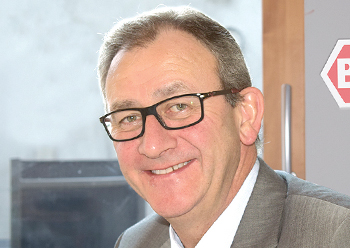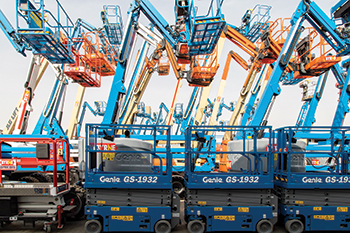Byrne expands for next phase of growth
Armed with a strong brand identity, the widest mix of equipment, and extensive infrastructure and experience in the entire region, Byrne Equipment Rental is now looking to soar to even greater heights in the Middle East.
01 September 2019
Byrne Equipment Rental is entering a new phase of growth, having recently expanded its fleet of hoists and access equipment with the purchase of some 300 machines.
“Byrne Equipment Rental is well poised for this growth, having built a strong brand identity, an extensive infrastructure covering the whole GCC, the widest mix of equipment promoting the ‘one-stop-shop’ concept, experience of over 25 years in the region, extensive supplier arrangements, and systems and procedures that have survived the test of time,” Pat Fallon, group chief operating officer of Byrne Equipment Rental, tells Gulf Construction.
Byrne has never made any secret of its ambition of being the largest equipment rental and lease organisation in the region. And its recent investment into the hoist and access division as well as the launch of its new Climate Control division results in Byrne being able to further support its clients and their business requirements, he says.
 |
|
Fallon ... Byrne Equipment Rental is well poised for growth. |
“This, in turn, has seen the business grow year-on-year and overall continues in Byrne’s diversification and product range which is built upon its successful ‘one stop shop’ model approach, satisfying all equipment rental requirements across multiple industries,” he adds.
Fallon indicates that the expansion of its access equipment fleet is in response to market demand in the region.
“Demand for access equipment has grown dramatically in recent years throughout the Middle East. This is where we see access as yet another rental and lease solution that complements our established business model and, more importantly, underscores our supply capability in the equipment rental field,” he points out.
With the latest economic changes in the region, which point towards further substantial growth in the coming years, Byrne is well placed to expand its existing business in line with this growth and open new business lines capitalising on its existing infrastructure in place, according to Fallon.
Byrne, which offers a purely rental service, currently has more than 750 items of access equipment in its fleet, with its most popular machines being its mast climbers and scissors lifts. It works with trusted suppliers in the region, including Power Towers, Alimak Hek, Genie and JLG.
 |
|
Byrne supplies a full range of vertical access solutions for the construction industry. |
The specialist company supplies a full range of vertical access solutions for people and materials, including transport platforms, material hoists and mast climbers which are designed to provide a versatile and safe working environment for the construction industry.
Its hoist and access fleet includes a wide range of mobile elevating work platforms (MEWPS), comprising a broad mix of scissor lifts (both electric and diesel), telescopic booms, articulated booms and electric booms. In addition, it offers a range of low-level access platforms, which include Power Towers’ Single, Duo, Pecolift, Ecolift and Nano units.
Byrne offers mast climbers with a reach of up to 200 m. Single masts can carry a load of 2,500 kg and twin masts can carry 4,500 kg. Its range of material hoists and transport platforms can also reach a maximum of height of 200 m with a capacity of 2,000 kg.
Another popular machine in its inventory is the scissor lift. The company has a wide range in this category with a maximum reach of 18.15 m.
Byrne also provides boom lifts with a maximum reach of 28.21 m and Power Towers with a maximum reach of 5.1 m.
Among the unique machines in Byrne’s fleet is the Genie Xtra Capacity (XC) boom lift, which updates the brand’s earlier popular telescopic unit.
Fallon says the Genie Xtra Capacity models offer a dual lift capacity to perform a wide range of heavier lift tasks on construction sites, with innovative features to help increase productivity and efficiency.
Other equipment in Byrne’s fleet includes a special range of low-level access machines from Power Towers, which provides users a safe and efficient working platform. These are safer than manual ladders, steps, podiums and small scaffold towers while ultimately reducing labour costs.
“The low-level access equipment can suitably replace scaffolds and step ladders, thus minimising the risks associated with heights,” Fallon points out.
Access equipment forms a growing segment of Byrne’s entire rental fleet which currently comprises more than 10,000 items – a number that continues to rise, the most recent purchases having been the 300 machines added to its hoist and access fleet in March this year.
Fallon says its equipment is available on short or long-term hire. “Typically, we do not offer hire-purchase although we are willing to look at this on a case-by-case basis,” he adds.
Fallon stresses that it is important to understand the client’s needs, which is part of Byrne’s business strategy.
“A recent construction project was no different when a client had to speed up installation. To achieve this, we supplied a safe and unique solution that cannot be found anywhere else in the market: three material hoists running independently on the same mast,” he says with pride.
Commenting on the rental market for access equipment in the Gulf, Fallon says Byrne Rental has seen a sizeable shift in demand for operational efficiency from clients as the region’s market matures.
Clients are looking for equipment that enables them to operate faster and more cost-effectively, hence the need for suppliers that they can trust, he adds.
Powered access equipment is versatile, easy to use and is increasingly being recognised as the safest and most efficient way to carry out a range of tasks at height, he says.
“The global market is becoming more safety-conscious and hoist and access equipment focuses on operator safety. Therefore, it is no surprise that demand for this equipment has sky-rocketed in the last few years,” Fallon remarks.
He adds that the rental business model is preferable for a number of businesses and rightly so.
“There are a number of advantages to renting as opposed to buying equipment. It enables businesses to access a wide range of compliant, reliable and safe equipment when they need it, and for as long as they need it. They can avoid costly downtime, with no maintenance, ongoing storage or service costs as this is taken care of by us and our 24/7 back-up service. Furthermore, no capital outlay for rental ensures that our clients can preserve their capex for their core business,” Fallon points out.
Also, in addition to cost efficiency and access to a modern and safe fleet, renting is increasingly seen as sustainable. It maximises equipment utilisation and reduces waste and therefore is a preferable solution for business in today’s market.
Byrne has 20 operational bases across the UAE, Saud Arabia, Kuwait, Qatar, Oman and Bahrain, a fleet of more than 10,000 items of plant and a team of over 1,500 people offering high quality turnkey solutions to multiple sectors.
The company was recently acquired by Itqan Investments and Tamar VPower Energy Fund, and Byrne’s clients in the GCC have continued to receive an outstanding level of service.
“They have and will continue to benefit from a growth in our rental fleet, both in terms of size and diversity,” he comments.
Byrne has appropriate quality control procedures to ensure the safety of its equipment. “As an example, our mast climbers are checked and maintained on a monthly basis. Furthermore, Byrne prides itself on its commitment to customer service which is unparalleled in the industry and this is supported by providing a 24/7 service as standard,” Fallon adds.
To further support its clients, Byrne has newly opened its IPAF Training Centre, a first in the region to offer training on both MEWPs and mast climbing work platforms (MCWPs). “The centre gives our clients further peace of mind when dealing with Byrne, and shows that we at Byrne hold safety as priority when dealing in the access sector,” Fallon concludes.



